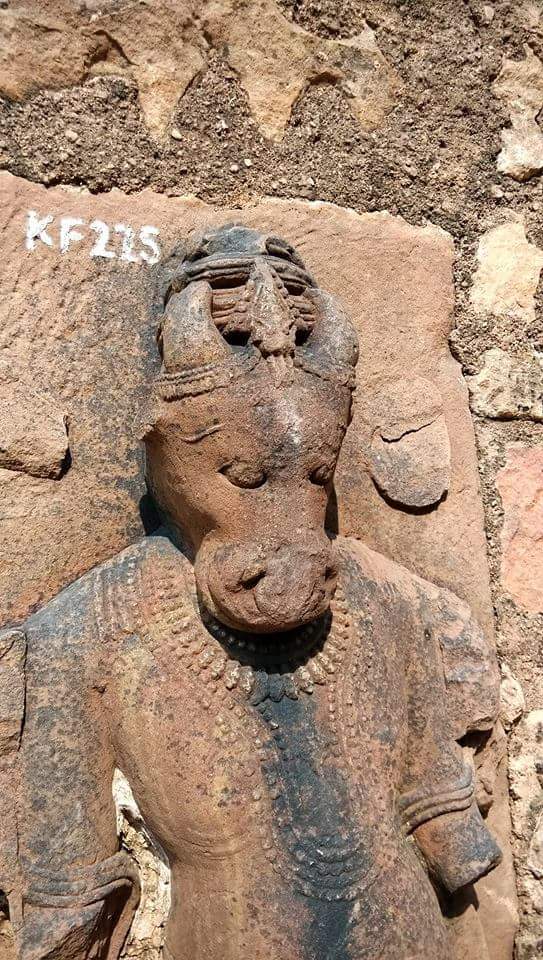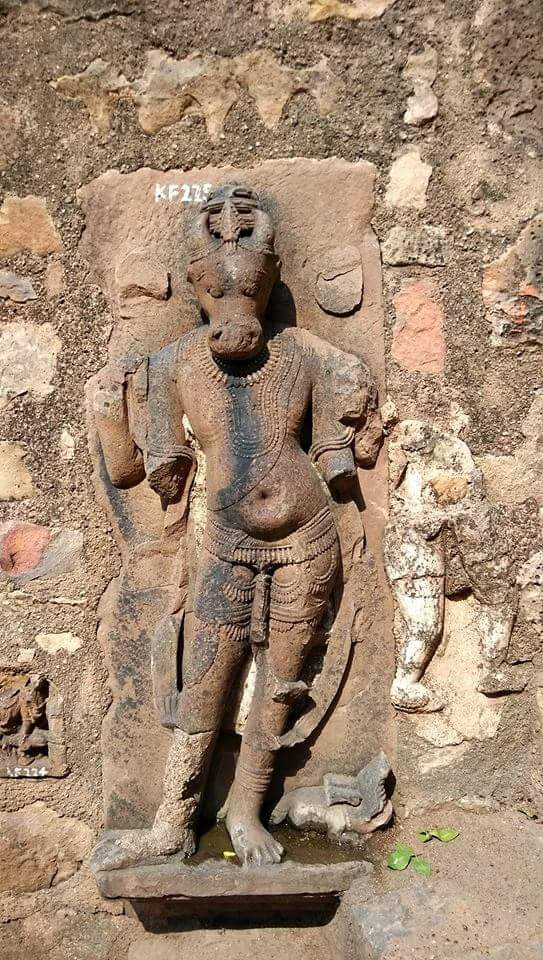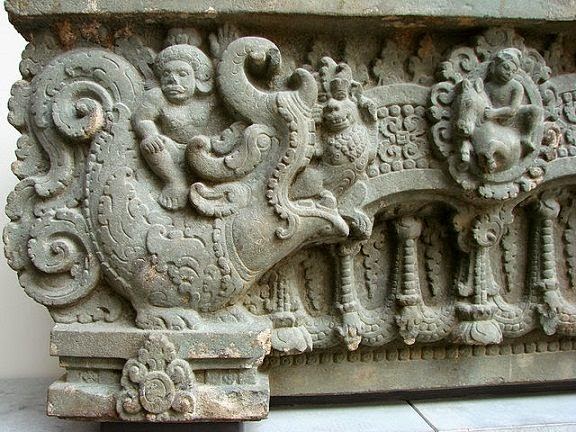http://tinyurl.com/y5rwkp4w
Image may be NSFW.
Clik here to view.
Image may be NSFW.
Clik here to view.
Hieroglyph: †*ḍagga -- 3 ʻ cattle ʼ. 2. †*ḍhagga -- 2 . [Cf. *ḍaṅgara -- 1 , *daṅgara -- ]
1. WPah.kṭg. ḍɔggɔ m. ʻ a head of cattle ʼ, ḍɔgge m.pl. ʻ cattle ʼ, sat. (LSI ix 4, 667) ḍōgai ʻ cattle ʼ.2. S.kcch. ḍhago m. ʻ ox ʼ, L(Shahpur) ḍhaggā m. ʻ small weak ox ʼ, ḍhaggī f. ʻ cow ʼ, Garh. ḍhã̄gu ʻ old bull ʼ. (CDIAL 5524) Rebus: ḍāṅro ʻ term of contempt for a blacksmith ʼ(N.)(CDIAL 5524).
Image may be NSFW.
Clik here to view.

Image may be NSFW.
Clik here to view.

14)Rare Nandi embedded in wall. Here he is shown as four handed and riding on his Vahana Makara which is somewhat unique depiction. Note emotion of Nandi displayed through scuplture. Work of genius indeed.
Image may be NSFW.
Clik here to view.
Clik here to view.

Makara on lentil from Sambor Prei Kuk temple, Kampong Thom City, Cambodia
http://en.wikipedia.org/wiki/File:Mus%C3%A9e_Guimet_897_03.jpg
http://en.wikipedia.org/wiki/File:Mus%C3%A9e_Guimet_897_03.jpg
Image may be NSFW.
Clik here to view.
Clik here to view.

Hoysaleswara Temple wall carving of Makara. Disgorged from the mouth of makara is a smith, artisan. makara = elephant + tiger + crocodile Rebus reading: karabha, ibha 'elephant' rebus: karba, ib 'iron' + kola 'tiger' rebus: kol 'working in iron', kolhe 'smelter' + karāvu 'crocodile' rebus: khār 'blacksmith'. Thus makara composite signifies a metalworker.
Hieroglyph: makara 'composite animal' rebus: dhamá in cmpds. ʻ blowing ʼ Pāṇ., dhamaka -- m. ʻ blacksmith ʼ Uṇ.com. [√dham ]Pa. dhama -- , ˚aka -- m. ʻ one who blows ʼ, Pk. dhamaga<-> m.; K. dam m. ʻ blast of furnace or oven, steam of stewing ʼ; -- Kho. Sh.(Lor.) dam ʻ breath, magical spell ʼ ← Pers. dam. (CDIAL 6730)
1. WPah.kṭg. ḍɔggɔ m. ʻ a head of cattle ʼ, ḍɔgg
karā rebus:khār 'blacksmith' .
I submit that the breath-taking iconography is prayer by the artisan, seafaring maritime trade merchant to Varuṇa, the divinity of the ocean. The sculpture repeats the message on three stones of the stone.
To the right of Varuṇa is Viṣṇu on Garuḍa. garuḍa 'eagle' rebus: karaḍā 'hard alloy'.
karat.i, karut.i, kerut.i fencing, school or gymnasium where wrestling and fencing are taught (Ta.);garad.i, garud.i fencing school (Ka.); garad.i, garod.i (Tu.); garid.i, garid.i_ id., fencing (Te.)(DEDR 1262).
Rebus 1: करडा [ karaḍā ] Hard fromalloy--iron, silver &c. Rebus 2: khara_di_ = turner (G.)
वरुण N. of a partic. magical formula recited over weapons R. (v.l. वरण) Rebus: m. (once in the TA1r. वरुण्/अ) " All-enveloping Sky " , N. of an आदित्य (in the वेद commonly associated with मित्र [q.v.] and presiding over the night as मित्रover the day , but often celebrated separately , whereas मित्र is rarely invoked alone ; वरुण is one of the oldest of the Vedic gods , and is commonly thought to correspond to the Îá½ÏανÏÏ of the Greeks , although of a more spiritual conception ; he is often regarded as the supreme deity , being then styled " king of the gods " or " king of both gods and men " or " king of the universe " ; no other deity has such grand attributes and functions assigned to him ; he is described as fashioning and upholding heaven and earth , as possessing extraordinary power and wisdom called माया , as sending his spies or messengers throughout both worlds , as numbering the very winkings of men's eyes , as hating falsehood , as seizing transgressors with his पाश or noose , as inflicting diseases , especially dropsy , as pardoning sin , as the guardian of immortality ; he is also invoked in the वेद together with इन्द्र , and in later Vedic literature together with अग्नि , with यम , and with विष्णु ; in RV. iv , 1 , 2, he is even called the brother of अग्नि; though not generally regarded in the वेद as a god of the ocean , yet he is often connected with the waters , especially the waters of the atmosphere or firmament , and in one place [ RV. vii , 64 , 2] is called with मित्र , सिन्धु-पति , " lord of the sea or of rivers " ; hence in the later mythology he became a kind of Neptune , and is there best known in his character of god of the ocean ; in the MBh. वरुण is said to be a son of कर्दम and father of पुष्कर , and is also variously represented as one of the देव-गन्धर्वs , as a नाग , as a king of the नागs , and as an असुर ; he is the regent of the western quarter [cf. लोक-पाल] and of the नक्षत्र शतभिषज् [ VarBr2S. ] ; the जैनs consider वरुण as a servant of the twentieth अर्हत् of the present अवसर्पिणी) RV. &c &c (cf. IW.10 ; 12 &c ); the ocean; water; pl. (prob.) the gods generally AV. iii , 4 , 6 (Monier-Williams)
वरुण N. of a partic. magical formula recited over weapons R. (v.l. वरण) Rebus: m. (once in the TA1r. वरुण्/अ) " All-enveloping Sky " , N. of an आदित्य (in the वेद commonly associated with मित्र [q.v.] and presiding over the night as मित्रover the day , but often celebrated separately , whereas मित्र is rarely invoked alone ; वरुण is one of the oldest of the Vedic gods , and is commonly thought to correspond to the Îá½ÏανÏÏ of the Greeks , although of a more spiritual conception ; he is often regarded as the supreme deity , being then styled " king of the gods " or " king of both gods and men " or " king of the universe " ; no other deity has such grand attributes and functions assigned to him ; he is described as fashioning and upholding heaven and earth , as possessing extraordinary power and wisdom called माया , as sending his spies or messengers throughout both worlds , as numbering the very winkings of men's eyes , as hating falsehood , as seizing transgressors with his पाश or noose , as inflicting diseases , especially dropsy , as pardoning sin , as the guardian of immortality ; he is also invoked in the वेद together with इन्द्र , and in later Vedic literature together with अग्नि , with यम , and with विष्णु ; in RV. iv , 1 , 2, he is even called the brother of अग्नि; though not generally regarded in the वेद as a god of the ocean , yet he is often connected with the waters , especially the waters of the atmosphere or firmament , and in one place [ RV. vii , 64 , 2] is called with मित्र , सिन्धु-पति , " lord of the sea or of rivers " ; hence in the later mythology he became a kind of Neptune , and is there best known in his character of god of the ocean ; in the MBh. वरुण is said to be a son of कर्दम and father of पुष्कर , and is also variously represented as one of the देव-गन्धर्वs , as a नाग , as a king of the नागs , and as an असुर ; he is the regent of the western quarter [cf. लोक-पाल] and of the नक्षत्र शतभिषज् [ VarBr2S. ] ; the जैनs consider वरुण as a servant of the twentieth अर्हत् of the present अवसर्पिणी) RV. &c &c (cf. IW.10 ; 12 &c ); the ocean; water; pl. (prob.) the gods generally AV. iii , 4 , 6 (Monier-Williams)
